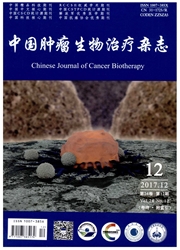

 中文摘要:
中文摘要:
目的:构建肿瘤组织特异的噬菌体呈现型单链抗体库,用噬菌体体内筛选与肿瘤血管特异性结合的单链抗体,为癌症的诊断和治疗奠定基础。方法:取食道癌、胃癌、脑癌、肺癌、脊髓瘤患者肿瘤组织,提取各肿瘤组织膜蛋白混合后免疫BALB/c小鼠,取鼠脾脏淋巴细胞提取总RNA,用RT—PCR分别扩增抗体重、轻链可变区基因(VH和VL),经Linker连接形成ScFv基因片段,将ScFv基因片段与噬菌粒载体pCANTAB 5E的连接产物转化大肠杆菌TG1,在辅助噬菌体M13K07的作用下,获得重组噬菌体单链抗体库。以人宫颈癌HeLa细胞致瘤裸鼠为实验模型,用所构建的单链抗体库进行了4轮特异抗体的体内筛选。挑取了24个PCR鉴定为阳性的单链抗体做免疫组化分析,将在HeLa致瘤的组织切片上呈阳性染色、而在对照的肾组织切片上没有阳性染色的单链抗体进行序列测定。结果:选用7株不同的肿瘤细胞系建立裸鼠致瘤模型,以HeLa细胞致瘤裸鼠成瘤效果最好。用所构建的库容量为1.6×10^6的单链抗体库对肿瘤血管特异结合抗体进行体内筛选,得到1株单链抗体ScFv(VH-linker-VL),命名为ScFvH1。结论:成功构建肿瘤特异单链抗体库,并用此抗体库筛选到与肿瘤血管结合特异性较好的单链抗体,为肿瘤的早期诊断和治疗提供了一条新的技术路线。
 英文摘要:
英文摘要:
Objective: To obtain phage-displayed ScFv library targeting tumor tissues and to screen for antibodies specifically binding to tumor vessels using in vivo phage display, so as to lay a foundation for diagnosis and treatment of cancer. Methods: The membrane proteins were extracted from the specimens of esophageal carcinoma, stomach carcinoma, brain cancer, lung cancer, and spinal cord tumor. The recombinant phage-antibody system was used to construct a single chain Fv fragment (ScFv) cDNA library from the total RNA of the BALB/c mice immunized with purified membrane protein. The specific primers of VH and VL. were used to amplify the cDNA of VH and VL, respectively, which were then assembled into ScFv gene with a specially constructed linker DNA. The ScFv gene was ligated into the phagemid vector pCANTAB 5E and the ligated samples were transformed into competent E. coli TG1. The transformed cells were infected with M13K07 helper phage to yield recombinant phage. Using the animal model of human cervical carcinoma (HeLa cells) , sepecific phage-ScFvs were selected by phage displaying and panning in vivo. After four rounds, 24 phage-ScFvs, which were identified by PCR, were analyzed immunohistochemically. The ScFvs expressed in the tumor tissue slices and negative in control kidney tissue slices were sequenced. Results: Tomors-bearing animal models were established with 7 different kinds of carcinoma cell lines in BALB/c nude mice. It was found that inoculation with HeLa cells resulted in most satisfactory tumorigenesis in nude mice. A ScFv library of 1.6×10^6 was obtained and a tumor vessel specific phage-ScFv named ScFvH1 (VH-linker-VL) was selected from the library. Conclusion: A tumor targeting ScFv library has been successfully constructed and a tumor vessel-specifrc antibody has been identified from the library, which provides a new way for the early diagnosis and therapy of cancer.
 同期刊论文项目
同期刊论文项目
 同项目期刊论文
同项目期刊论文
 期刊信息
期刊信息
